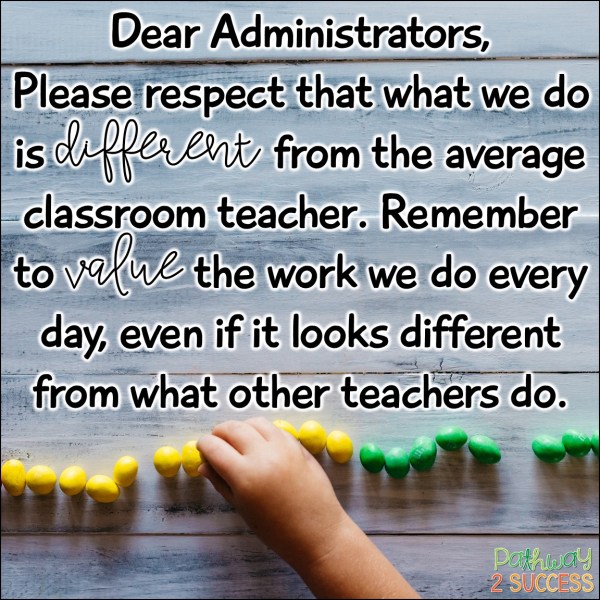
Dear administrators,
Let me start off by saying that I write this letter on behalf of special educators. While it’s true that I might not speak for every single special ed teacher, after spending 10 years in the classroom, I like to think I speak for many.
First off, we truly appreciate all that you do. As a special educator, our caseloads are often so small compared to the number of students you must interact with on a daily basis. We understand that the mandates, challenging behaviors, and needs of a whole school are a lot to handle. We respect your role and want to be there to support you to make the best possible impact on our school community together. But in order to do this together, there are a few things you need to know from the special educators you work with.
Please respect that what we do is different from the average classroom teacher. And when I say that, I don’t mean better or worse. We’re just different. While a teacher might have multiple report card comments and grades to enter, we spend time updating our IEP goals. While a regular educator grades a stack of tests, we are scoring, analyzing, and writing reports for our educational evaluations. Please value the work that we do every day, even though it doesn’t look exactly the same as other teachers.

When you walk into our classrooms, please don’t judge us right off the bat. Special educators must be masters of going with the flow and putting out a fire before it becomes an inferno. You might not even realize we are using these skills in the moment, but we are. If you walk in and we’re playing Uno or talking about our dogs, trust me, there’s a really good reason. If you see us blissfully walking past a behavior that another student would probably get a detention for, we’re not clueless. We’re using planned ignoring in an effort to extinguish that behavior. When you notice we are celebrating something that seems like a small task, it’s because it took that child a lot to get there. And yes, the classroom might be a complete disaster at any given moment. Whether that’s because a child had an emotional meltdown or because we just haven’t had a moment to clean up from our craft activity, know that we are working on it.
Understand that relationship-building is an essential part of our job. We are expected to help kids work on their weaknesses every day, pushing them to go further and further. This takes a truly special type of bond between an educator and the students. Sometimes that means we have to do silly things or just spend time building those relationships up. This isn’t wasted time. It’s an investment in building confidence and relationships with our students so we can help them get to where they need to be.

Know that there are parts to our job you may never “see”. While some of these are not specific to special ed, I do think it’s important to note them. We spend countless hours communicating with parents through email, on the phone, and in person to build strong home-school connections. We tirelessly collaborate with regular education teachers to try and find a balance between the appropriate level of supports and modifications. Many special educators also spend nights answering additional parent emails to update on a child’s day, writing educational reports for an upcoming IEP meeting, and finding materials to bring our lessons to live for our students. To be quite honest, there’s not enough time to do everything during the school day. So, even though you don’t see these things happening, just know that they are and we’re working really hard to make a difference every day.
Give us positive feedback. Of course, you should tell us you appreciate us and that we’re an asset to the building, but do more than that. Let us know specifically what you saw that showed us what a great job we’re doing. Write us a quick note expressing how you saw how we interacted with a student who was having a tough moment and helped to turn that child’s day around. Send a quick email recognizing how organized we were for a really challenging IEP meeting that went on.
Spend time in our classrooms. Get to know our students and how amazing they are every single day. At the next IEP meeting for each child, we would love nothing more than for you to share something positive you saw that child doing or discuss a strength you’ve seen in action. Being in our classrooms helps you understand our needs, too. Special educators have a way of solving problems without ever making an issue out of it. We would love for you to see how innovative and creative we are, but also to recognize the needs for things in our room we don’t have.

Recognize the amazing work of our paraprofessionals. I even like to call them paraeducators because that’s what they are. Educators. So often, the paraeducators in a school go unnoticed. They work magic with our students and our the true backbone to a strong special education department. While they don’t often want the spotlight, it would mean so much to us if you could recognize the hard work they do day in and day out.
Encourage us to grow. We are specialized in special education, but that doesn’t mean we know everything. Offer us new strategies, share recent articles about techniques you’ve heard of, and even encourage us to attend an outside professional development session on a topic that would make a difference for our learners.
Most importantly, know we love our students. In special ed, it is absolutely always about the kids. With that, we know what’s best for our kids. When we suggest a reading program, modification, or communication device for our learners, it’s because they really need it. When we mention that a student really needs paraprofessional support, it’s because we professionally know this is the right step to be made. We’re not trying to make things easier for our kids or make our own lives easier either. We are always trying to push our kids forward. Sometimes that means taking one step back before a leap can be made. Know that in every single decision we make, it’s for our kids.

The job of a special educator is seriously challenging. So much so that half of special ed teachers will quit within the first 5 years. And half of those teachers who make it will leave the profession within 10 years. This isn’t said to scare anyone, but instead to prove that it’s important to listen to the voices of special educators across the country. Start with the ones in your own school and community. Talk to them. Ask them how they’re doing and what they need. Give them the support, encouragement, and autonomy to make the best choices they can for their learners.
Sincerely,
Special Education Teachers








This was more than perfect. Am a 34 year teacher and love my job more now than ever before!
I have great administration and is as supportive as possible. Admin doesn’t really have a clue of all that we do. They don’t have time to breathe much less know what is going on in all the classes, especially the ones that don’t have all the graduate requirements.
Thanks for putting everything in writing— great job and appreciated.
SAW
Thank you! You so clearly and effectively touched on EVERYTHING! I may just print this out to show my principal. :)
Honestly this was SO therapeutic to write! Special ed is such a separate area and admin need to understand us as educators. I’m glad you love it as much as I do!
Love this. I am blessed to work with a principal and sped director that really understand what I do and why.
I have been in Special Education for 30 years, so I am telling my age. I have worked with the very low functioning students all of my professional career. My middle daughter who just recently turned 34 and is special needs has been my inspiration for my career . I do not regret one day over the past 30 years for the path I chose to go down. My biggest regret of my professional career is that administers truly have no concept of what we do in our classroom.
Thank you for sharing this !!!!